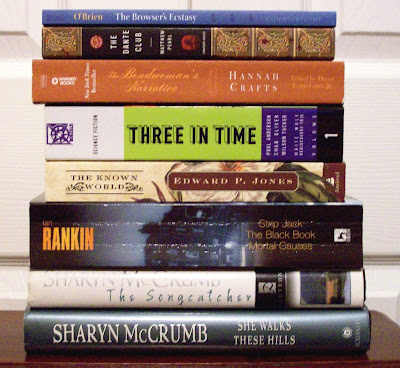
Most of us have seen, or know of, the Alfred Hitchcock film based on Patricia Highsmith’s
Strangers on a Train, a fascinating movie despite the fact that Highsmith absolutely hated the way that Hitchcock tamed her story to the extent that she thought he had ruined it by eliminating much of its shock value. Highsmith followed
Strangers on a Train with
The Price of Salt, a 1952 “lesbian novel” that she published under the name Claire Morgan. It was in 1954 that she published the second novel under her real name, one that she and some readers and critics believe to be “more complex and sophisticated: than its more famous predecessor.
The Blunderer is the story of Walter Stackhouse, a man who feels trapped in his marriage to the neurotic Clara, and who is indeed a world-class blunderer. Clara, after being told by Walter that he plans to go to Reno to divorce her, makes a suicide attempt that she only survives because Walter returns home just in time to get her to a hospital where her life is saved.
But it is when Walter becomes obsessed with the brutal, and unsolved, murder of a woman at a bus rest stop that his real troubles begin. He instinctively believes that the woman’s husband had something to do with her murder and finds himself compulsively clipping a newspaper article about the case and even going to the man’s bookstore just to see if he looks like a murderer. Compulsion turns to obsession when Walter, in his dreams, follows his own wife to a rest stop and murders her in the way that he imagines the first woman has been killed. The dreams become so real to Walter that upon awakening he is almost certain that he has really killed his wife.
When Walter’s mother-in-law suddenly appears to be on her death bed and Clara boards a bus to take her to her mother’s hospital, Walter can’t explain even to himself why he feels compelled to follow the bus when it leaves the station. It is almost as if he is living the dream that has dominated his recent nights. At the first rest stop that the bus makes, Walter looks for Clara but can’t find her anywhere despite the fact that he spends most of the 15-minute rest stop asking people if they’ve seen her. The bus leaves, one passenger short, and Walter returns home where he decides not to notify the police that anything strange might have happened to his wife.
Clara’s body is found the next day and Walter begins to dig the hole that will make everyone believe that he is the likely killer. He starts his downward spiral by not telling the investigators that he followed the bus, an omission of fact that is easily disproved by the detectives who interview everyone at the rest stop and everyone who had been on the bus that night. As more and more of the truth about Walter and his relationship with his wife becomes known to the authorities, it appears more and more certain that he is the guilty man despite the fact that he is not the killer.
In typical Highsmith fashion, the detective investigating the murder of Clara Stackhouse is such an unethical and horrible man that, after a while, the reader has little expectation that justice will be served. In fact, one begins to wonder if justice even exists in the world she describes. This is a first-rate psychological novel, one that has a lesson to teach us all about how we choose to present ourselves to the world. I did not, however, find the book’s ending to be satisfactory. It doesn’t seem to fit the style of the rest of the book and does not quite ring true, feeling like a desperate attempt on Highsmith's part to wrap everything up as quickly as possible. That’s the only reason that I rate this book as a “4” rather than as a “5.”
The Blunderer would have made a great film in the hands of a director like Alfred Hitchcock because much of the plot revolves around the fact that things are just not what they appear to be when it comes to Walter Stackhouse and the death of his wife. Hitchcock was excellent at misdirection in his films and Highsmith’s novel provides many opportunities for that approach. But, as far as I know, he didn’t consider optioning the rights to this one and it was not until 1983 that anyone approached Highsmith about filming her book. Unfortunately, this project with HBO failed and the novel has not been filmed.
Rated at: 4.0






































